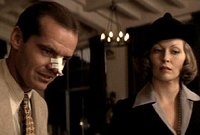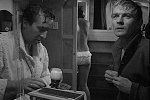
 MUST-SEE
MUST-SEE
scr Robert Towne
with Jack Nicholson, Faye Dunaway, John Huston, Perry Lopez, John Hillerman, Dick Bakalyan, Joe Mantell, Bruce Glover, Roy Jenson, Darrell Zwerling, James Hong, Nandu Hinds, Roman Polanski, Burt Young, Diane Ladd, Rance Howard
release US 20.Jun.74
reissue UK 23.Apr.04
Paramount
74/US 2h11

Nothing is what it seems: Nicholson and Dunaway



 Support Shadows: Buy a Poster
Support Shadows: Buy a Poster
|
 This is one of the most perfect combinations of cinematic talent ever put on screen--all credit to producer Robert Evans for bringing Polanski, Towne, Nicholson, Dunaway and Huston together to make what is arguably Hollywood's finest noir thriller. And thanks also for the pristine new print, back on the big screen where it belongs!
This is one of the most perfect combinations of cinematic talent ever put on screen--all credit to producer Robert Evans for bringing Polanski, Towne, Nicholson, Dunaway and Huston together to make what is arguably Hollywood's finest noir thriller. And thanks also for the pristine new print, back on the big screen where it belongs!
 It's a masterpiece of complex storytelling and character depth. Jake Gittes (Nicholson) is a private detective in 1937 Los Angeles, investigating the infidelities of a water board executive (Zwerling) whose sultry wife Evelyn (Dunaway) denies hiring Jake but changes her story when her husband's found dead. Jake's curiosity drags him much deeper into the situation as he uncovers what might be a major conspiracy to hold L.A. hostage to the water system owner, Noah Cross (Huston), who also happens to be Evelyn's estranged father.
It's a masterpiece of complex storytelling and character depth. Jake Gittes (Nicholson) is a private detective in 1937 Los Angeles, investigating the infidelities of a water board executive (Zwerling) whose sultry wife Evelyn (Dunaway) denies hiring Jake but changes her story when her husband's found dead. Jake's curiosity drags him much deeper into the situation as he uncovers what might be a major conspiracy to hold L.A. hostage to the water system owner, Noah Cross (Huston), who also happens to be Evelyn's estranged father.
Conflicting motivations and false leads fill the screen, along with revealed secrets, twisted relationships and surprise flashes of violence (Nicholson spends most of the film with a bandage and stitches on his nose after being fiercely attacked by Polanski's grinning goon). Richard Sylbert's production design and John Alonzo's cinematography gorgeously recreate the period and capture the inner workings of the characters without feeling pushy or flashy. Polanski's snaky, inventive directorial tricks seem invisible. And the performances are all note perfect. Nicholson and Dunaway are at the lean, sleek top of their craft, saying volumes with each slight glance. Huston mauls the screen with personality and humour. And even the bit players are superb, from thugs (Jenson and Polanski) and cops (Lopez and Bakalyan) to slimy businessmen (Hillerman) and eager sidekicks (Mantell and Glover).
And as the film progresses, it just gets better--the mystery expands and sharpens, the characters add layers upon layers, and clues and hints lurk in every scene about what's really going on and who's really who. This is expertly written and structured screenwriting. Even the title is a clever hint, as Jake continually recalls his previous life as a cop in Chinatown, where nothing was what it seemed. And of course, as the story inexorably draws him back there to a showdown with his former colleagues (Lopez's straight-arrow cop and Jenson's hired heavy), Polanski brilliantly grabs our hearts and minds and squeezes so subtly that we don't realise he's got us until it's too late.
 |
themes, language, violence | 25.Mar.04 |

 KNIFE IN THE WATER [Nóz w Wodzie]
KNIFE IN THE WATER [Nóz w Wodzie]

|
dir Roman Polanski • scr Jakub Goldberg, Roman Polanski, Jerzy Skolimowski with Leon Niemczyk, Jolanta Umecka, Zygmunt Malanowicz release Poland 9.Mar.62, US 28.Oct.63 • reissue UK 9.Apr.04 • 62/Poland 1h34  REVIEW BY RICH CLINE |
The plot is deceptively simple: Andrzej and Krystyna (Niemczyk and Umecka) have drifted into comfortable but not very passionate marriage. As they're heading off for a weekend on their sailboat, they encounter a 19-year-old hitchhiker (Malanowicz) who strikes a chord with both of them. Krystyna is attracted to this handsome young man, while Andrzej is stimulated by his youthful bravado. On a whim, they invite him onto the boat, and what follows is a subtle game of one-upmanship between the boy and Andrzej, while Krystina pretends to look on impassively. The tension builds steadily to a sudden rumble of violence that changes everything.
With gorgeous grey-scale cinematography by Jerzy Lipman, Polanski films the slow-burning action brilliantly, keeping all three characters in the frame no matter how they're configured on the boat, in the water, wherever. This softly evokes the shifts in power between the trio, allowing their superbly shaded performances to take on additional meaning. This is so expertly done that it still exhilarates 40 years later (helped by the pristine restored print). It hardly matters that the film is elusive and muted, and perhaps too packed with meaning.
This is both a gripping romantic thriller and a searing examination of the friction between experience and childishness--themes as potent today as they ever were. And the Soviet Poland setting is perhaps more eerily telling now than when the film was made, as it takes a sideways look at government inequity and rootless youth. It's to the filmmakers' credit that we find it hard to take sides; we merely want the situation to work out in some way. And the conclusion brilliantly captures this internal conflict in the viewer. Essential! [PG themes, suspense] 17.Mar.04


 Still waiting for your comments ... don't be shy.
Still waiting for your comments ... don't be shy.
HOME | REVIEWS | NEWS | FESTIVAL | AWARDS | Q&A | ABOUT | TALKBACK